
 In a ruling published late Tuesday, Judge John Koeltl of the US District Court for the Southern District of New York delivered a devastating blow to the US-led conspiracy against WikiLeaks founder Julian Assange. In his ruling, Judge Koeltl, a Bill Clinton nominee and former assistant special prosecutor for the Watergate Special Prosecution Force, dismissed “with prejudice” a civil lawsuit filed in April 2018 by the Democratic National Committee (DNC) alleging WikiLeaks was civilly liable for conspiring with the Russian government to steal DNC emails and data and leak them to the public. Jennifer Robinson, a leading lawyer for Assange, and other WikiLeaks attorneys welcomed the ruling as “an important win for free speech.” Article by Eric London, first published on 31 July 2019 at https://www.wsws.org/en/articles/2019/07/31/assa-j31.html. Illustrations by candobetter eds
In a ruling published late Tuesday, Judge John Koeltl of the US District Court for the Southern District of New York delivered a devastating blow to the US-led conspiracy against WikiLeaks founder Julian Assange. In his ruling, Judge Koeltl, a Bill Clinton nominee and former assistant special prosecutor for the Watergate Special Prosecution Force, dismissed “with prejudice” a civil lawsuit filed in April 2018 by the Democratic National Committee (DNC) alleging WikiLeaks was civilly liable for conspiring with the Russian government to steal DNC emails and data and leak them to the public. Jennifer Robinson, a leading lawyer for Assange, and other WikiLeaks attorneys welcomed the ruling as “an important win for free speech.” Article by Eric London, first published on 31 July 2019 at https://www.wsws.org/en/articles/2019/07/31/assa-j31.html. Illustrations by candobetter eds
Judge dismisses lawsuit
The decision exposes the Democratic Party in a conspiracy of its own to attack free speech and cover up the crimes of US imperialism and the corrupt activities of the two parties of Wall Street. Judge Koeltl stated:
If WikiLeaks could be held liable for publishing documents concerning the DNC’s political financial and voter-engagement strategies simply because the DNC labels them ‘secret’ and trade secrets, then so could any newspaper or other media outlet. But that would impermissibly elevate a purely private privacy interest to override the First Amendment interest in the publication of matters of the highest public concern. The DNC’s published internal communications allowed the American electorate to look behind the curtain of one of the two major political parties in the United States during a presidential election. This type of information is plainly of the type entitled to the strongest protection that the First Amendment offers.
The ruling exposes the illegality of the conspiracy by the US government, backed by the governments of Britain, Ecuador, Australia and Sweden and the entire corporate media and political establishment, to extradite Assange to the US, where he faces 175 years in federal prison on charges including espionage.
The plaintiff in the civil case—the Democratic Party—has also served as Assange’s chief prosecutor within the state apparatus for over a decade. During the Obama administration, Democratic Party Justice Department officials, as well as career Democratic holdovers under the Trump administration, prepared the criminal case against him.
The dismissal of the civil suit exposes massive unreported conflicts of interest and prosecutorial misconduct and criminal abuse of process by those involved. The criminal prosecution of Assange has nothing to do with facts and is instead aimed at punishing him for telling the truth about the war crimes committed by US imperialism and its allies.
The judge labeled WikiLeaks an “international news organization” and said Assange is a “publisher,” exposing the liars in the corporate press who declare that Assange is not subject to free speech protections. Judge Koeltl continued: “In New York Times Co. v. United States, the landmark ‘Pentagon Papers’ case, the Supreme Court upheld the press’s right to publish information of public concern obtained from documents stolen by a third party.”
As a legal matter, by granting WikiLeaks’ motion to dismiss, the court ruled that the DNC had not put forward a “factually plausible” claim. At the motion to dismiss stage, a judge is required to accept all the facts alleged by the plaintiff as true. Here, the judge ruled that even if all the facts alleged by the DNC were true, no fact-finder could “draw the reasonable inference that the defendant is liable for the misconduct alleged.”
Going a step further, the judge called the DNC’s arguments “threadbare,” adding: “At no point does the DNC allege any facts” showing that Assange or WikiLeaks “participated in the theft of the DNC’s information.”
Judge Koeltl said the DNC’s argument that Assange and WikiLeaks “conspired with the Russian Federation to steal and disseminate the DNC’s materials” is “entirely divorced from the facts.” The judge further ruled that the court “is not required to accept conclusory allegations asserted as facts.”
The judge further dismantled the DNC’s argument that WikiLeaks is guilty-by-association with Russia, calling the alleged connection between Assange and the Russian government “irrelevant,” because “a person is entitled to publish stolen documents that the publisher requested from a source so long as the publisher did not participate in the theft.”
Judge Koeltl also rejected the DNC’s claim “that WikiLeaks can be held liable for the theft as an after-the-fact coconspirator of the stolen documents.” Calling this argument “unpersuasive,” the judge wrote that it would “eviscerate” constitutional protections: “Such a rule would render any journalist who publishes an article based on stolen information a coconspirator in the theft.”
In its April 2018 complaint, the DNC put forward a series of claims that have now been exposed as brazen lies, including that Assange, Trump and Russia “undermined and distorted the DNC’s ability to communicate the party’s values and visions to the American electorate.”
The complaint also alleged: “Russian intelligence services then disseminated the stolen, confidential materials through GRU Operative #1, as well as WikiLeaks and Assange, who were actively supported by the Trump Campaign and Trump Associates as they released and disclosed the information to the American public at a time and in a manner that served their common goals.”
At the time the DNC filed its complaint, the New York Times wrote that the document relies on “publicly-known facts” as well as “information that has been disclosed in news reports and subsequent court proceedings.” The lawsuit “comes amid a swirl of intensifying scrutiny of Mr. Trump, his associates and their interactions with Russia,” the Times wrote.
It is deeply ironic that Judge Koeltl cited the Pentagon Papers case, New York Times Co. v. United States, in his ruling.
The DNC’s baseless complaint cited the New York Times eight times as “proof” of Assange and WikiLeaks’ ties to Russia, including articles by Times reporters Andrew Kramer, Michael Gordon, Niraj Chokshi, Sharon LaFraniere, K.K. Rebecca Lai, Eric Lichtblau, Noah Weiland, Alicia Parlapiano and Ashley Parker, as well as a July 26, 2016 article by Charlie Savage titled “Assange, avowed foe of Clinton, timed email release for Democratic Convention.”
The first of these articles was published just weeks after the New York Times hired James Bennet as its editorial page editor in March 2016. James Bennet’s brother, Michael Bennet, is a presidential candidate, a senator from Colorado and former chair of the DNC’s Democratic Senatorial Campaign Committee. In 2018, Bennet signed a letter to Vice President Mike Pence noting he was “extremely concerned” that Ecuador had not canceled asylum for Assange, who was then trapped in the Ecuadorian embassy in London.
“It is imperative,” the letter read, “that you raise US concerns with [Ecuadorian] President [Lenin] Moreno about Ecuador’s continued support for Mr. Assange at a time when WikiLeaks continues its efforts to undermine democratic processes globally.”
In April 2019, after the Trump administration announced charges against Assange, the New York Times editorial board, under James Bennet’s direction, wrote: “The administration has begun well by charging Mr. Assange with an indisputable crime.” Two weeks later, Michael Bennet announced his presidential run and has since enjoyed favorable coverage in the Times editorial page.
Additionally, the father of James and Michael Bennet, Douglas Bennet, headed the CIA-linked United States Agency for International Development in the late 1970s and early 1980s.
On Wednesday, the Times published a brief, six-paragraph article on page 25 under the headline, “DNC lawsuit against election is dismissed.” In its online edition, the Times prominently featured a link to its special page for the Mueller Report, which is based on the same DNC-instigated threadbare lies that Judge Koeltl kicked out of federal court
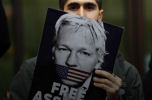 Courageous Australian MPs, Andrew Wilkie and George Christensen, visit Julian Assange in jail and call on the UK government to stop his extradition to the US, warning about the WikiLeaks founder's deteriorating condition. Below is a link to the excellent Australian ABC interview with Christensen (LNP) and Andrew Wilkie (Independent), who defend Assange extremely well. https://www.abc.net.au/radionational/programs/breakfast/australian-mps-visit-wikileaks-founder-julian-assange-in-prison/11978894
Courageous Australian MPs, Andrew Wilkie and George Christensen, visit Julian Assange in jail and call on the UK government to stop his extradition to the US, warning about the WikiLeaks founder's deteriorating condition. Below is a link to the excellent Australian ABC interview with Christensen (LNP) and Andrew Wilkie (Independent), who defend Assange extremely well. https://www.abc.net.au/radionational/programs/breakfast/australian-mps-visit-wikileaks-founder-julian-assange-in-prison/11978894


 Suelette Drefus, Julian Burnside, Kristinn Hrajnsson, and Lizzie O'Shea were the main people in this event. I have transcribed some of Suelette Drefus, Technology Researcher and Author's excellent summary of Julian Assange's contributions to the public internet and free software. She also displayed courage in criticising powerful people on stage. At around 1h 44m into the video she has the courage to criticise corporate media journalist,
Suelette Drefus, Julian Burnside, Kristinn Hrajnsson, and Lizzie O'Shea were the main people in this event. I have transcribed some of Suelette Drefus, Technology Researcher and Author's excellent summary of Julian Assange's contributions to the public internet and free software. She also displayed courage in criticising powerful people on stage. At around 1h 44m into the video she has the courage to criticise corporate media journalist, 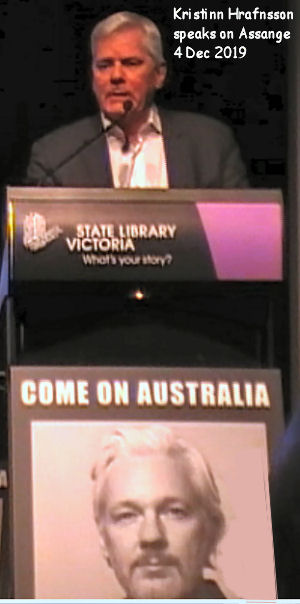

 The Parliamentary Joint Committee on Intelligence and Security (PJCIS) is busy finalising its consideration of the
The Parliamentary Joint Committee on Intelligence and Security (PJCIS) is busy finalising its consideration of the  Kristinn Hrafnsson - Editor in Chief of WikiLeaks
Kristinn Hrafnsson - Editor in Chief of WikiLeaks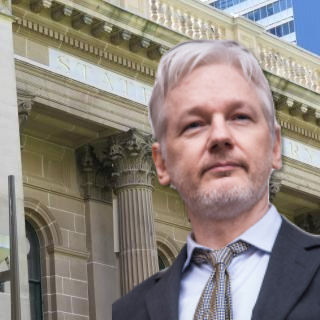
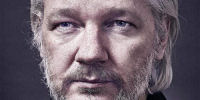 Please consider attending the PEN Sydney annual Day of the Imprisoned Writer event 15/11/19. This year, Quentin Dempster will interview Jennifer Robinson, counsel to Julian Assange and WikiLeaks.
Please consider attending the PEN Sydney annual Day of the Imprisoned Writer event 15/11/19. This year, Quentin Dempster will interview Jennifer Robinson, counsel to Julian Assange and WikiLeaks. 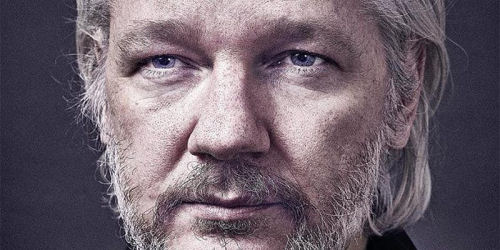

 In a ruling published late Tuesday, Judge John Koeltl of the US District Court for the Southern District of New York delivered a devastating blow to the US-led conspiracy against WikiLeaks founder Julian Assange. In his ruling, Judge Koeltl, a Bill Clinton nominee and former assistant special prosecutor for the Watergate Special Prosecution Force, dismissed “with prejudice” a civil lawsuit filed in April 2018 by the Democratic National Committee (DNC) alleging WikiLeaks was civilly liable for conspiring with the Russian government to steal DNC emails and data and leak them to the public. Jennifer Robinson, a leading lawyer for Assange, and other WikiLeaks attorneys welcomed the ruling as “an important win for free speech.” Article by Eric London, first published on 31 July 2019 at
In a ruling published late Tuesday, Judge John Koeltl of the US District Court for the Southern District of New York delivered a devastating blow to the US-led conspiracy against WikiLeaks founder Julian Assange. In his ruling, Judge Koeltl, a Bill Clinton nominee and former assistant special prosecutor for the Watergate Special Prosecution Force, dismissed “with prejudice” a civil lawsuit filed in April 2018 by the Democratic National Committee (DNC) alleging WikiLeaks was civilly liable for conspiring with the Russian government to steal DNC emails and data and leak them to the public. Jennifer Robinson, a leading lawyer for Assange, and other WikiLeaks attorneys welcomed the ruling as “an important win for free speech.” Article by Eric London, first published on 31 July 2019 at 
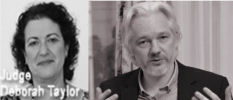 Pontius Pilate, of course, was the judge who condemned Jesus Christ to death, according to the bible. The crime Jesus was punished for was that of leading a religion critical of the values of the Roman state. Modern authorities try to defend their right to have criminal secrets in order to justify pursecuting Assange, who has led a world-wide movement for transparent and just government. If UK or Swedish judges deliver Assange to authorities who then deliver him to the United States, they may claim that they are only doing their duty under the law, just like Judge Pontius Pilate. I am not religious, but I think this is a valuable parable for our time.
Pontius Pilate, of course, was the judge who condemned Jesus Christ to death, according to the bible. The crime Jesus was punished for was that of leading a religion critical of the values of the Roman state. Modern authorities try to defend their right to have criminal secrets in order to justify pursecuting Assange, who has led a world-wide movement for transparent and just government. If UK or Swedish judges deliver Assange to authorities who then deliver him to the United States, they may claim that they are only doing their duty under the law, just like Judge Pontius Pilate. I am not religious, but I think this is a valuable parable for our time.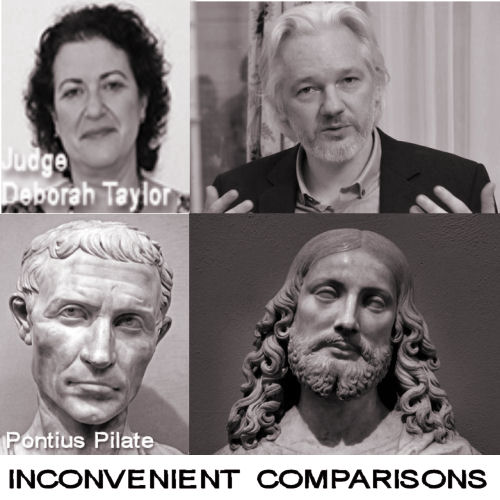
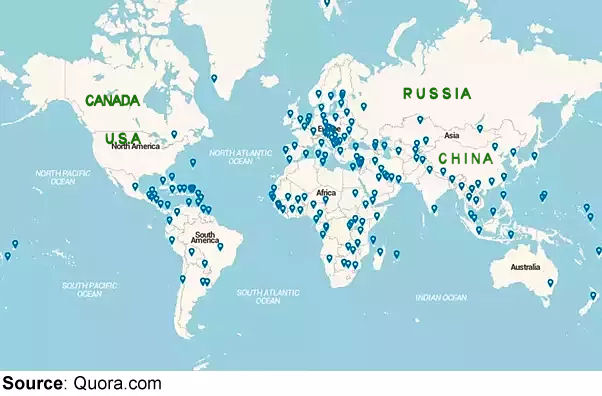
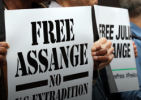 The most honest man in Britain today is Julian Assange, while the most dishonest are those who are engaged in his ongoing persecution.
The most honest man in Britain today is Julian Assange, while the most dishonest are those who are engaged in his ongoing persecution. 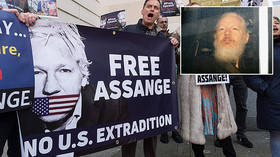
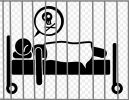 Wikileaks statement: Wikileaks has grave concerns about the state of health of our publisher, Julian Assange, who has been moved to the health ward of Belmarsh prison. Mr Assange's health had already significantly deteriorated after seven years inside the Ecuadorian embassy, under conditions that were incompatible with basic human rights. The United Nations twice found him to have been arbitrarily detained and called on the United Kingdom to honor its committments under international law and free him. The UK's refusal to abide by UN rulings, and its subsequent treatment of Mr. Assange since his arrest, presents serious questions about the UK's standing as a human rights-abiding nation.
Wikileaks statement: Wikileaks has grave concerns about the state of health of our publisher, Julian Assange, who has been moved to the health ward of Belmarsh prison. Mr Assange's health had already significantly deteriorated after seven years inside the Ecuadorian embassy, under conditions that were incompatible with basic human rights. The United Nations twice found him to have been arbitrarily detained and called on the United Kingdom to honor its committments under international law and free him. The UK's refusal to abide by UN rulings, and its subsequent treatment of Mr. Assange since his arrest, presents serious questions about the UK's standing as a human rights-abiding nation. In midst of an interesting and wide-ranging
In midst of an interesting and wide-ranging 
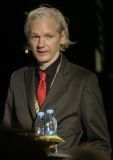

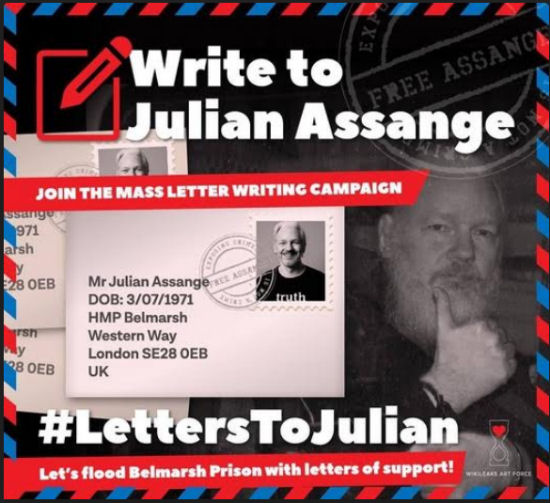
 This discussion on Crosstalk asks whether in the prosecution or persecution of Julian Assange, the western world is seeing the death of journalism. Michael Patchett-Joyce, a barrister specialising in international and European law, brings some new views to the program. John Wight counters with some persuasive political analysis, as does ex-British parliamentarian, George Galloway. The issue of the courts and the 'public good' comes up. John Wight points out that this is an issue of class; the public good is really about the good of the establishment. Galloway says that, if Julian is extradited to the United States, there will be no juries and the US will not feel itself bound to any promises it may have made to Britain in this matter. Patchett-Joyce suggests that the case has a long way to go before a decision can be made about extradition. At no time does anyone mention Julian's cat, but we think this might be a picture of it.
This discussion on Crosstalk asks whether in the prosecution or persecution of Julian Assange, the western world is seeing the death of journalism. Michael Patchett-Joyce, a barrister specialising in international and European law, brings some new views to the program. John Wight counters with some persuasive political analysis, as does ex-British parliamentarian, George Galloway. The issue of the courts and the 'public good' comes up. John Wight points out that this is an issue of class; the public good is really about the good of the establishment. Galloway says that, if Julian is extradited to the United States, there will be no juries and the US will not feel itself bound to any promises it may have made to Britain in this matter. Patchett-Joyce suggests that the case has a long way to go before a decision can be made about extradition. At no time does anyone mention Julian's cat, but we think this might be a picture of it. This very informative article is republished from
This very informative article is republished from 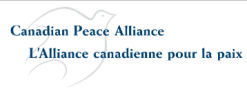 The Canadian Peace Alliance (CPA) condemns the governments of Ecuador, the UK, and USA, for their collaboration in arresting and extraditing journalist Julian Assange. This was not a secretive operation carried out under the cover of darkness. Rather, it was handled very roughly and in broad daylight to send a chill into the bones of would-be investigative journalists and whistle-blowers around the globe.
The Canadian Peace Alliance (CPA) condemns the governments of Ecuador, the UK, and USA, for their collaboration in arresting and extraditing journalist Julian Assange. This was not a secretive operation carried out under the cover of darkness. Rather, it was handled very roughly and in broad daylight to send a chill into the bones of would-be investigative journalists and whistle-blowers around the globe.
 The President of Ecuador, on flimsy pretext, has thrown Julian Assange to the wolves. Today Ruptly footage shows Assange being manhandled by several police from the embassy into a police vehicle. Julian had long hair and a long beard and was shouting, "The UK must resist," and something about "the Trump administration." From somewhere else, the Ecuadorian President delivered a prepared speech to cameras from his wheelchair, stating, among other things, that the UK Government has agreed in writing that Julian would not be sent anywhere he might be tortured or face the death penalty. Wikileaks has said, however, that Assange has been arrested for 'extradition to the United States for publishing'.
The President of Ecuador, on flimsy pretext, has thrown Julian Assange to the wolves. Today Ruptly footage shows Assange being manhandled by several police from the embassy into a police vehicle. Julian had long hair and a long beard and was shouting, "The UK must resist," and something about "the Trump administration." From somewhere else, the Ecuadorian President delivered a prepared speech to cameras from his wheelchair, stating, among other things, that the UK Government has agreed in writing that Julian would not be sent anywhere he might be tortured or face the death penalty. Wikileaks has said, however, that Assange has been arrested for 'extradition to the United States for publishing'.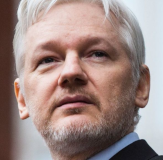
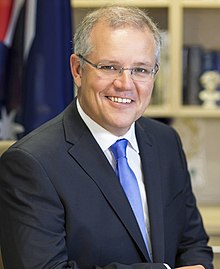
 Video: French demonstrate outside the Australian embassy in Paris, calling for the cowardly unprincipled Australian Government to help Julian Assange. "Where are the 'We are all Charlie' freedom of the press demonstrators?" they cry.
Video: French demonstrate outside the Australian embassy in Paris, calling for the cowardly unprincipled Australian Government to help Julian Assange. "Where are the 'We are all Charlie' freedom of the press demonstrators?" they cry.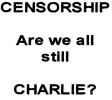 Not so long ago the middle classes were marching enthusiastically all over the western world to defend freedom of the press, after the massacre of journalists at Charlie Hebdo. "We are all Charlie!" they cried. Now there is hardly a peep about Julian Assange's cruel and unusual punishment for telling the world of war-crimes. Certainly no mass marches in the street. What's the difference? The mainstream press is singing a different song. It suited them to have people marching in the streets about Charlie Hebdo. Now, for some reason, it doesn't.
Not so long ago the middle classes were marching enthusiastically all over the western world to defend freedom of the press, after the massacre of journalists at Charlie Hebdo. "We are all Charlie!" they cried. Now there is hardly a peep about Julian Assange's cruel and unusual punishment for telling the world of war-crimes. Certainly no mass marches in the street. What's the difference? The mainstream press is singing a different song. It suited them to have people marching in the streets about Charlie Hebdo. Now, for some reason, it doesn't.
Recent comments